| RACING HISTORY |
YEAR: 2007
COMPETITIONS
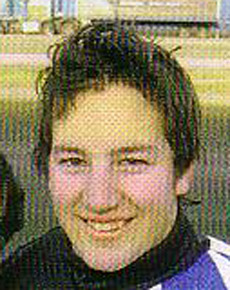 |
Nathan (19 years) was first licenced in the 2004/05 season and is employed by his father Phil Williamson. He had his first totalisator drive in March 2005 at Oamaru and since that time has established himself as not only a very competent Junior Driver but is also excelling as a free lance driver as well.
His biggest success last season was driving Jasmynís Gift to win the Group 1 NZ Trotting Free-For-All on Show Day.
The Maurice Holmes Memorial Junior Driver Trophy applies to all Junior Driver races conducted at Addington during the season and Nathan through some consistent efforts has pipped his good friend and rival Gavin Smith in the race for the title. It is ironical that Gavin pipped Nathan in the past seasons NZ Junior Drivers Championship which encompasses all Junior Driver races throughout NZ.
Final Points Standings were as follows :-
Nathan Williamson 20 points
Gavin Smith 19 points
Sam Smolenski 13 points
In addition to the Trophy, Nathan received, courtesy of New Zealand Metropolitan Trotting Club, a return trip to Australia with spending money plus $500 worth of clothing.
Credit: Tony Lye
YEAR: 2006
PRESIDENTS: NZMTC
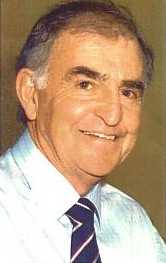 |
When Peter Andrews became a member of the NZ Metropolitan Trotting Club in 1966, he had been on the waiting list for six years. And when he agreed to serve as a club steward, he had a four-year wait before getting the call-up.
After 30 years of high-duty as a club administrator, Andrews retired with his last official act being attendance at the club's AGM in September 2004. During that time, Andrews has been the loyal racing servant, not only for the club but in many other capacities. His list of various positions is verification of this:
1974 - Elected a steward of the Met.
1979 - Elected to the committee of the Met.
1984-89 - Vice President of the Met.
1989-94 - Chairman of the Met.
1989-93 - Council member of the Inter-Dominion Council.
1993-94 - Vice-Chairman of the Inter-Dominion Council.
1995-2001 - Harness Racing nominee on the NZ Racing Industry Board.
1998-2000 - Chairman of the NZRIB Dates Committee.
2002 - President of the NZ Standardbred Breeders National Council.
At the time Peter retired from the Met committee, Mike Grainger, writing in the Harness Racing Weekly commented as follows.
Andrews applied for membership of the Met as soon as he left school, in 1958. His father Stan was a member of the Canterbury Park Club, and later would become President and a director of Addington Raceway.
Andrews recalls the late Eugene McDermott approaching him at the Methven races, where he was representing race sponsor Caltex, to see if he would stand as a club steward. "I was waiting in the wings for a while. When I got on, I was the youngest by far. I know I didn't call any of them by their christian names. Everyone was 'Mister'. And after my first committee meeting - and I had done my homework - I was taken aside and told I had had too much to say."
Andrews said he received a thorough education in the club's activities from such leaders as Murray Taylor and Dan McCormick, who he said were "great presidents." The end-of-the-meeting tote and attendance report by the President was always an important address. "He would announce the figures and the crowd numbers. You were expected to be there...you were conspicuous by your absence," he said.
At the time of his appointment as a steward, the club raced just eight times a year. "When the Easter Meeting was over, you then had to wait until the National Meeting in August. It disappoints me now to see that it is so hard to get people to serve the club, but I know that is because of the commitment it requires. The number of meetings restricts those available, and I am a great believer that people must participate fully for the industry to progress," he said.
Andrews reflects on his role on the sponsorship committee, which he enjoyed so much. "Working with DB, Firestone, Air New Zealand and Toyota were wonderful days. "I had a great team around me when I was President, and everybody did their bit."
He enjoyed his six years on the Racing Industry Board, where his major challenge was dealing with the sensitive issues chairing the Dates Sub-Committee. "I was told by John Falloon, the Racing Minister, that I had to make decisions for the betterment of the Industry. Some people had the impression that I had to be working for harness racing."
A keen breeder and owner, Peter's best on-track performer was Lady El, winner of eight races, and his last success came as a syndicate member of the Dean Taylor-trained Dreamy Chick.
A successful businessman, Peter sponsored numerous races throughout the South Island, further endorsing his true commitment to the Industry. He was also a keen sportsman and loved his cricket and rugby, and enjoyed a game of golf in the latter part of his life.
In harness racing it would be difficult to find a more committed and passionate person, one whose wisdom has taken the sport into the 21st century.
Peter is survived by his wife Ruth and three sons Mark, Nigel and Simon, and two grandchildren.
Credit: Harness Racing NZ
YEAR: 2006
PEOPLE
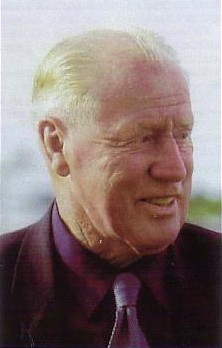 |
| Derek Jones MMNZ |
He was a superior horseman who trained more than 1000 winners, an entertaining raconteur and speaker, eulogist, part-time barber, and one who never lacked stamina when social activities demanded it. He was a spark at any gathering: no-one left his company without a smile. In short, he had qualities that cut a man above the rest. His death, last Friday at the age of 79, after complications following heart surgery three days earlier, was unexpected.
In the dust cover of his biography 'Win Without Boasting', author Don Wright introduced it by saying: "A master horseman, devoted industry servant, family patriarch, humorist, and a friend to all, especially those in less fortunate circumstances. Those qualities and characteristics sum up the life of Derek Jones MMNZ. A respected citizen, his consideration for others and ability to make friends is legendary. His mirth, humour and generosity towards all, including his staff, young horsemen and rivals have endeared him to many from all walks of life and stamped as a pillar of the industry. The famous Templeton trainer/driver is patriarch of a harness racing family that continues to exert a profound influence."
As an administrator, he was President of the New Zealand Trotting Trainers' and Driver' Association, and served in the same capacity for the Banks Peninsula Trotting Club. He was a trustee of the Addington Harness Racing Hall of Fame, honoured with a special award from the NZ Trotting Hall of Fame, and he gained recognition outside harness racing for the work he did inside with his NZ Order of Merit award six years ago.
He was also a tireless campaigner for achieving a fee for drivers. "When I started, a trainer didn't get paid if he drove a horse he trained. But you got paid if you drove a horse for someone else. It was ludicrous."
Derek's remarkable record as a trainer and a driver have been overshadowed in recent years by talented family members profiting from his actions in standing aside. Son Peter said winning the New Zealand Cup for his father with Hands Down was a bigger thrill than when he trained Borana to win it. "I wanted the win with Hands Down to be a bigger thrill for my parents than me. It was a way of paying them back for all they had done for me."
Derek's grandson Anthony Butt was given favourable opportunities to establish himself, and in his first season of driving won the national junior drivers, title. Butt recalled a remark that was so typical of his grandfather..."I remember being in the drivers' room after Blossom Lady ran fifth in her first NZ Cup, and feeling so disappointed about it, but Derek came into the room and said 'at least it saves us from having a party'. I felt a bit better after that." His brother Roddy was also a former national junior driving champion, and Tim, another grandson, trained recent champions Take A Moment and Lyell Creek, plus top liners Sonofthedon, Happy Asset, Mister D G and Foreal. Other trainers who 'did their time' with Derek and became successful were Nigel McGrath, Erin Crawford, Stephen Doody, Kelvin Harrison, Ray Sharpe and Andrew Stuart.
Training in partnership with Jack Grant, Derek headed the Training Premiership twice, in 1965 and 1969. Grant, who was with Derek for 24 years and stable foreman before becoming a training partner, said: "They were the best years of my life. If anyone should have driven 1000 winners" - he drove 814 - "it should have been Derek, but he stood down for Peter and then for Anthony."
Top trainers Max Miller and Tommy Behrns can vouch for his generosity and kindness. Miller said: "He was a special sort of fellow. I had Jacquinot Bay who was a good horse, and I wanted to race him in sprints and take him to Hutt Park. It didn't suit the owner who wanted to race him in the Cup, so he got Derek to train him. He ran third in the Hannon but didn't do much else. When he was sold, soon after, Derek sent the commission to me. I wouldn't expect many others to do that."
Behrns said he was the most caring guy in the game, "and we are not talking about racing here. I'm referring to the times he spent seeing the elderly and infirmed. Time after time you would see him leaving the trials and take off to visit someone in a home or the hospital. There wouldn't be a month that went by without him coming to see dad (Jack), and for the last five years he was housebound and didn't get many visitors. He meant the world to dad. He'd done it all his life."
Derek was born in Christchurch in 1926 and became a hardresser "long enough for me to get sick of it". He started his driving career at Methven in 1946, aged 19, and drove his first winner - Quite Clever - in a division race at Riccarton two months later. Soon after, he moved north, winning races with Silent Knight and Culture, two smart horses trained by Dan Fraser.
His first horse of great class was Soangetaha, who arrived while he was still a young man. A son of Light Brigade, Soangetaha was one of three horses brought south by Derek in 1949 following an air crash that claimed the life of Andy Ryland. Culture and Barrier Reef were the others. Soangetaha won 15 races including two Auckland Cups, two heats of the Inter-Dominion and was runner-up in the Grand Final. "He was a superb horse. They talk about Harold Logan, but I never had a horse that could begin as quick." The year after Soangetaha was beaten in the Grand Final, he won the Dominion Handicap with Barrier Reef, always regarded by Derek as the fastest trotter he has driven. Many good horses followed, including Trueco, Dismiss, Somerset Lad, Slick Chick, Cheta, Lochgair, Dispense, Snowline, Dupreez, Our Own, Diarac, Doctor Dan, Ardleigh, Smokeaway and Disband.
Derek had great affection for Disband, a U Scott mare renowned for her notoriously bad manners at the start. "She would never begin," he said. "The first time she got a mobile she had too much class for them."
At the end of the 60s and start of the 70s, Leading Light, Light View and Topeka were stable stars, followed by Premiership, Hands Down and Blossom Lady. Hands Down won a NZ Cup, three Easter Cups, four Louisson Handicaps and a NZ Free-For-All. Derek drove him in most of his trackwork, but Peter handled him on raceday.
As great as the good ones were, Derek thought Blossom Lady was the best of them. "Ability-wise, she had to be the best I had." He said when she was at her peak that he had to "murder her in training. The harder you were on her, the better she would race. It was simply a matter of facing up to that reality. Her recovery powers after strenuous races and work were amazing. That was what stood to her and made her such a great stayer." Besides the NZ Cup, she won 43 other races including two Standardbred Breeders Stakes, a NZ Free-For-All, two Hunter Cups and five Inter-Dominion Heats.
During that time, principal owner Ralph Kermode wrote a letter to Derek that said in part: "Thank you for all the time and effort you have put into 'Bloss' and the expert way you have managed her and kept her going so long. Thank you for your frequent hospitality and your friendship."
Outside of harness racing, visiting the sick and delivering eulogies at funerals, Derek enjoyed the opera and musicals, rugby, travelling, meeting friends and making new ones, and supporting his wider family. Just days before he died, he was making plans for his next overseas trip. Nothing, however, gave him as much pleasure as helping someone else less fortunate than himself.
In that respect, he truly was a man without peer.
He is survived by his son Peter, daughters Glenys, Jennifer and Leigh, 10 grandchildren and 10 great grandchildren.
-o0o-
The funeral was held at Addington Raceway on Monday 3 July, 2006 attended by about 1500. The white hearse was led down the straight by the pacer Bowencourt because she has such a close resemblance to Blossom Lady. He left the track to the commentaries of Blossom Lady and Hands Down winning their Cups echoing around the course.
-o0o-
On a board in the stable is a sign on diplomacy, which reads "The ability to tell a person to go to hell in such a way that he looks forward to the trip."
Credit: Mike Grainger writing in HRWeekly 5Jul06
YEAR: 2006
PEOPLE
Dudley Moore, who died recently in a Blenheim rest home at the age of 88, had a long and notable association with harness racing. Along with his brother Dennis, he bred and raced the wonderful pacer Caduceus, and stood at stud the successful sire, Tuft.
Caduceus, by U Scott from Little Ada, won 28 races in NZ, 18 in Australia, and took a record of 1:57.8 in the US when he was 12. He was trained by Jack Litten to win the 1960 Inter-Dominion Grand Final at Harold Park at his sixth attempt, when he was nine.
Moore was a former steward of the NZ Metropolitan Trotting Club and was a regular vendor at the national yearling sales.
He is survived by five children, including Dennis, who bred the 2005 NZ Cup winner, Mainland Banner.
Credit: HR Weekly 29Oct06
YEAR: 2006
PEOPLE
Bill McDonald, the breeder and early trainer of the outstanding juvenile Starship, died recently. He was 81 and suffered from the degenerative eye disease glaucoma before cancer took its toll this year.
He was born in Christchurch. He started in the printing business, sold pet food and ran a dairy before starting work for Noel Berkett. In the mid 1960s he was breeding and training himself, with Red King, Whippet, Loyal Friend, Lord Flicka and First Girl being some of his early winners. He had a great deal of success with horses other people had given up on, including Full of Promise, the last horse he trained, who won four in succession on the West Coast circuit in 1996.
His major success came from breeding Starship, Star Heritage (dam of Star Loner, 1:54.2, Atom Star, 1:52, Star of Mine, 1:52.4) and Venetian Star (dam of Anvil's Star, 1:59.3, Soky's Special, 1:57.8 and Star Rhapsody, 1:58.1) from Star Nurse. By Good Chase, Star Nurse left 12 foals, but Starship was by far the best. He won 16 races from 81 starts, for $341,975. McDonald trained him for 12 wins before selling him for what then he called "a fortune".
For most of his career he trained at Woodend and then moved to Rangiora about 12 years ago. He was loyal to his drivers, particularly to Ian Cameron, and they would often travel to meetings together with their horses. He was a regular seller at the National Yearling Sales.
One of 15 children, McDonald grew up in the Depression and was taught to live frugally.
Credit: HRWeekly 16Nov06
YEAR: 2006
PEOPLE
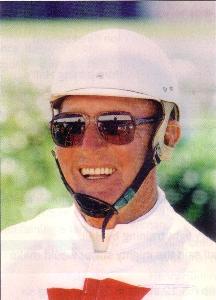 |
In his era, he was a champion professional track sprinter, and twice, in 1941 and 1946, won the prestigious Tuatapere New Year's Day Sheffield (over 135 yards). Between times, he was an air gunner with the RNZAF based in England and Ireland.
His flagship horse was Maida Million, a mare by Brahman he raced in partnership with Les Dyet. She won nine races before being sold and joining Eddie Cobb's stable, where she raced with great success and was four times leading aged mare in the U.S.
He trained Rustic Lad to win 14 races for Southland owner Bill Faulkner. Most notable was the one in May, 1958, giving Maurice Holmes his 1000th winning drive. As a driver, one of his most memorable occasions was one with Fiery Cross at Forbury Park, where a rein broke and he had to climb on the back of the horse to bring it under control. For that, the club made a presentation to him.
His best trotter was Bachelor Tom, a speedy and stylish trotter by Bachelor Hanover who won 14 races, and others of note included Hobart Lord, Fantastic and Noodlum's Fella. His last winning drive was Five Star at the Hororata meeting in 1996, his last training win came with Toffee Nose at Ashburton a year ago, and three years ago he was still driving at the workouts.
He was ably supported by his wife and companion Noline, who shared the same love of horses and racing. He is also survived by a daughter Robyn Robb, three grandchildren and four great-grandchildren.
Credit: HRWeekly 6Dec06
YEAR: 2006
PEOPLE
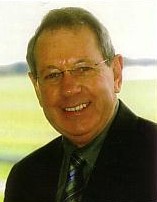 |
His retirement has prompted a trans-Tasman search, but as Canterbury Jockey Club Chief Executive Tim Mills says, "they're pretty big boots to fill." However, Murtha's experience and depth of knowledge about racing won't be lost. NZRB Head of Broadcasting, Glen Broomhall, says Murtha will continue to work with the New Zealand Racing Board and use his lifetime of experience to contribute to the future of race broadcasting. "Reon's vast experience will be used to mentor a new generation of race callers, with a view to maintaining the high standards to which he has always been committed," Broomhall said.
Murtha's first introduction to racing was on the West Coast where his father was on the committee of the Reefton Jockey and Trotting Clubs and his grandfather was a Clerk of the Course. "It was a boyhood ambition of mine to become a race caller," he remembers. It all started in the late 1950s. A young man's dream of calling the best of them past the winning post was nurtured and practised by calling ice-cream stick races for his mates on the many small creeks and water races that surround the small, sleepy West Coast coal-mining township of Reefton. Reon Murtha, once NZ's only full time professional racecaller, describes those early races as "a feat of imagination. You had to use a lot of imagination to keep the flow going as the gaily painted ice-cream sticks, often named after popular racing stars of the day, floated down the mine water races," he recalls "They would get caught up in the brambles or eddies, and I would have to keep the commentary going, sometimes for ages."
"I was probably the youngest person to frequent the pubs in Reefton," Reon confesses, "but all with good cause." His father took over the agency for the 'Turf Digest' and 'Friday Flash', and Reon earned pocket-money operating the sale of these as a paper round. "I had a regular clientele of 109 customers, and what they didn't buy I would sell in the pubs around town."
In 1959, at the tender age of 17, Reon packed his bags and headed off to an interview at the Greymouth offices of the NZ Broadcasting Corporation. His dream - to be a race caller... But not yet, for it seemed his voice had not matured enough, and there were no vacancies at the time. However, he still joined the corporation as a technician. Little did he realise then that over the next years thousands would hear him call the winners of Inter-Doms, NZ Cups and strangely enough, royal weddings and papal visits.
In 1960, Reon's dreams finally began coming true. The Reefton Jockey Club, looking for a racecaller, asked him to try out for the position, sight unseen. They were not dissappointed. Reon used this opportunity to make a demonstration tape, and on the strength of this tape and several departures from the staff of the Greymouth broadcasting offices, he was appointed race caller to the Greymouth Trotting Club.
In the years that followed until his appointment as race caller with the Canterbury Jockey Club in 1969, Reon used the time to refine and hone to perfection his skills of race calling. He describes it as the skill of being able to put into words what your eyes can see, recognising colours and names, without interrupting the flow of the commentary.
While there was no official training for such a calling, he says training as a radio announcer on Greymouth radio stations helped him to use his voice and language in the right way and achieve his aspiration. But it isn't the easiest of professions to master. Many people can call famous past races as they happened, but few possess that extra ingredient of being able to talk about something the instant it happens, without interrupting the flow, when there are thousands of people hanging on to your every word. Each horse's name and colours have to be learned before the race starts; then when it is all over you instantly discard them and start afresh on a new set of horses for the next race.
Travelling back and forth across the Southern Alps to cover meetings on both sides of the island was hard work; so, in 1971, following the Inter-Doms, Reon packed his bags and transferred to the Christchurch offices of Radio NZ. From there, Reon's career has taken him all over the world. He has called Inter-Doms from Australia; attended the Red Mile in Lexington, Kentucky, in 1983; travelled to Europe in 1984 to attend the English Derby.
Invited as a guest commentator for the Royal wedding of Prince Andrew and Sarah Ferguson in 1986, Reon ranks that as his most memorable occasion. As part of the Radio NZ team covering the Commonwealth Games at Edinburgh, Reon was invited to join a team of eight commentators covering the wedding for the ABC, and his particular section was the royal procession to and from Westminster Abbey. "We had to translate the colour and spectacle of the occasion for the thousands of listeners world-wide. My most nervous moment ever."
His career since then has been studded with both thoroughbred and harness racing industry awards reflecting his outstanding contribution, as well as mainstream awards like the MNZM he received in 2005 for services to broadcasting.
Calling such historic races as the 1980 NZ Cup duel between Delightful Lady and Hands Down at Addington has contributed to scores of great memories, but Murtha is well known as an objective caller who doesn't allow his opinions and emotions to influence his commentating. It hasn't always been easy to subdue the excitement; for example, the South Island Thoroughbred Breeders Stakes in April this year, which was won by Ombre Rose, a filly he part-owns, was just one of seven wins in which he was able to call her home first. The professionalism he maintained on that occasion and at all times has earned him respect industry wide.
"Reon has been the voice of Addington since 1971," said Addington Raceway CEO Mike Godber. "His calls of the great NZ Cups and Inter-Dominion Finals have been heard and seen throughout Australasia and made him a legend in his own right. He is the last of a great era of radio commentators who called through the 1970s and 80s. Reon has been a true professional through his background training in radio, and he was just as effective on Trackside TV and ranks right up there with the legendary commentators Dave Clarkson and Peter Kelly," Godber said.
Mills says Murtha's retirement marks the end of an era. "Racing is an industry that revolves around horses, jockeys and trainers, but there are others who put an important mark on the game," Mills said. "Reon has been an outstanding personality on the turf. Generations of race followers gew up with his voice. His name was synonymous with racing in the south. He is a true grentleman of the game - you never hear a bad word about him. He will be very difficult to replace.
Credit: HRWeekly 4Oct06
YEAR: 2006
PEOPLE
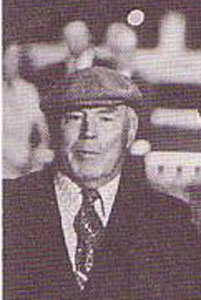 |
He was based at Pleasant Point when he bred No Response. He prepared the Hodgen's Surprise - Cordsworth gelding for his first two wins at Orari and Washdyke after the gelding began his racing career as a 6-year-old. No Response was transferred to Richard Brosnan at Kerrytown after Black had a stroke.
No Response won 12 races, including the Inter-Dominion Final, from 16 starts in the 1978/79 season. He also won three heats of the Inter-Dominion and the NZ Trotting Championship on the final day of the carnival. He was voted Harness Horse of the Year in 1979, the first trotter to win the title. No Response won the 1981 Rowe Cup in Auckland. He retired the winner of 24 races from 60 starts.
Credit: HR Weekly 26Oct06
YEAR: 2006
PEOPLE
 |
His best winner was the Keep Away mare, Peterson's Pride, who won four races - two at Addington and a double at Blenheim. In three of them she was driven by Russell Carter, who achieved greater awards later with Miss Pert, and in the other by Peter Mounce, Trevor's son. She paid $40.65 beating Scottish Chat and Armbro Pine, and gave Peter his first winning drive.
But his major triumph was preparing Mighty Chief to win two races when he was an old horse, unsound, and more or less retired from racing by his owner, Lester Clark. By My Chief, Mighty Chief had been a top trotter for Clark, winning the Dominion Handicap fron Acquit and Flying Maiden when he was just five. He won a further three as a 6-year-old, but had fewer than a dozen starts over the next three seasons.
After Clark had gone to Forbury to handle Flying Nominee for Mounce, he told him he would be better off trying one he had in the paddock at home - Mighty Chief. Mounce picked him up the next day, and with months of slow work round the country roads, a diet of swans eggs and the use of methylated spirits to harden his legs, brought him up to race fitness again.
As a 10-year-old, he resumed in grand style at Addington, winning for Bob Nyhan, beating Tony Bear and Merrin, and paying $84.75. He held his form, winning again two starts later at Greymouth with Clark driving, and was placed six times after that. He was raced lightly over the next two seasons, and gained a placing, which ended a remarkable comeback. "It was a labour of love, and they played the Addington race at his funeral," said his son John.
Mounce, who died last week a month short of his 88th birthday, has most of his family associated with harness racing to some extent.
Credit: Mike Grainger writing in HRWeekly 20Sep06
YEAR: 2006
MESCELLANY
Friday, 21 April 2006 saw the publication of the last issue of the Friday Flash. As the name suggests the "Flash" was a weekly paper that covered all the weekend galloping, harness (and later) greyhound race meetings, track work and trials form and articles of general interest to followers of racing.
When it was first published on 22 June 1956, the "Flash" was confined to racing information, but over recent years, in an effort to bolster the paper's appeal, was expanded to cover a wide range of sports.
Over the years the "Flash" had been the source of much valuable information for both the punters and those with an interest in racing. Its demise will be sorely felt.
Credit: C G Steele
| << PREVIOUS | 1 2 3 4 5 6 7 8 9 10 11 12 13 14 15 16 17 18 19 20 21 22 23 24 25 26 27 28 29 30 31 32 33 34 35 36 37 38 39 40 41 42 43 44 45 46 47 | NEXT >> |